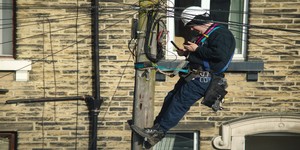Lords ask for input on broadband plans
February 20, 2012 | 10:13
Companies: #government #house-of-lords

The Lords Select Committee on Communications has launched a call for evidence as part of the government's plans to boost Britain's broadband to lead Europe by 2015.
Entitled 'Will superfast broadband meet the needs of our “bandwidth hungry” nation?,' the call for evidence asks organisations and individuals for their input to help drive policy debate for the government's approach to providing citizens with access to high-speed broadband connectivity. By 2015, the government has previously pledged, Britain's broadband network should lead Europe.
The document asks a range of questions of respondents, including what changes are expected to take place in the use of digital communications over the next 20 years and how such predicted changes should affect current and future strategic investment. Other questions include whether the government's investment - currently totalling £530 million - is being effectively applied in order to maximise social and economic benefit, whether broadband speed is the most effective metric for measuring success, and issues surrounding rural broadband and the current struggles with convincing telecommunications companies to invest in areas with very few prospective customers.
'Superfast broadband is clearly an important development across Britain, not just for economic growth but also because it will impact on how people do things such as view media content, shop and even access healthcare,' proclaimed Lord Inglewood, chair of the Communications Committee, in an announcemnent regarding the investigation. 'We want to look into the Government’s proposals to find out if its targets are likely to be met and whether it is being ambitious enough in its plans. Issues such as investment, Britain's market in fibre optic products and whether the advances in broadband provision will require regulatory changes are all things that need to be looked at to ensure the strategy works.'
The Committee has praised industry incumbents BT and Virgin Media for their work on high-speed fibre-optic broadband products, while predicting that speeds of 1Gb/s may be needed by 2020. 'Current investment,' the Committee warns, 'looks unlikely to be sufficient to deliver this.'
Feedback from the inquiry, which is open to the public as well as to commercial interests, will be used to shape government policy on broadband investment and provision. Under the government's current plan, high-speed broadband will be available to at least 90 per cent of UK premises by 2015 while speeds of at least 2Mb/s will be available to all.
The call for evidence can be downloaded from the Lords Select Committee on Communications in PDF format, if you feel like having your say on the matter.
Entitled 'Will superfast broadband meet the needs of our “bandwidth hungry” nation?,' the call for evidence asks organisations and individuals for their input to help drive policy debate for the government's approach to providing citizens with access to high-speed broadband connectivity. By 2015, the government has previously pledged, Britain's broadband network should lead Europe.
The document asks a range of questions of respondents, including what changes are expected to take place in the use of digital communications over the next 20 years and how such predicted changes should affect current and future strategic investment. Other questions include whether the government's investment - currently totalling £530 million - is being effectively applied in order to maximise social and economic benefit, whether broadband speed is the most effective metric for measuring success, and issues surrounding rural broadband and the current struggles with convincing telecommunications companies to invest in areas with very few prospective customers.
'Superfast broadband is clearly an important development across Britain, not just for economic growth but also because it will impact on how people do things such as view media content, shop and even access healthcare,' proclaimed Lord Inglewood, chair of the Communications Committee, in an announcemnent regarding the investigation. 'We want to look into the Government’s proposals to find out if its targets are likely to be met and whether it is being ambitious enough in its plans. Issues such as investment, Britain's market in fibre optic products and whether the advances in broadband provision will require regulatory changes are all things that need to be looked at to ensure the strategy works.'
The Committee has praised industry incumbents BT and Virgin Media for their work on high-speed fibre-optic broadband products, while predicting that speeds of 1Gb/s may be needed by 2020. 'Current investment,' the Committee warns, 'looks unlikely to be sufficient to deliver this.'
Feedback from the inquiry, which is open to the public as well as to commercial interests, will be used to shape government policy on broadband investment and provision. Under the government's current plan, high-speed broadband will be available to at least 90 per cent of UK premises by 2015 while speeds of at least 2Mb/s will be available to all.
The call for evidence can be downloaded from the Lords Select Committee on Communications in PDF format, if you feel like having your say on the matter.

MSI MPG Velox 100R Chassis Review
October 14 2021 | 15:04








Want to comment? Please log in.